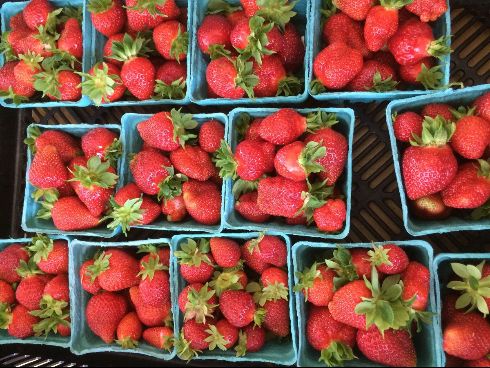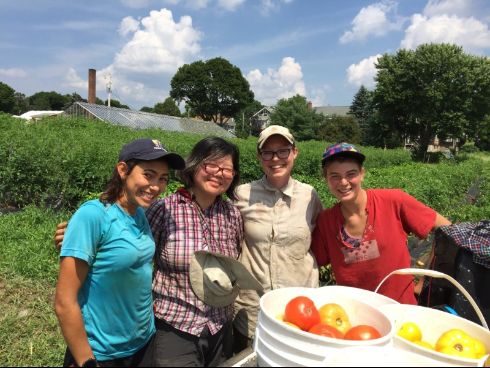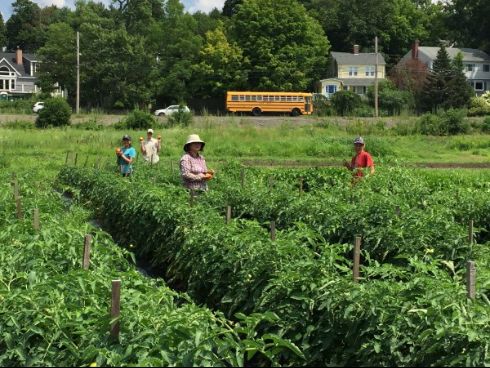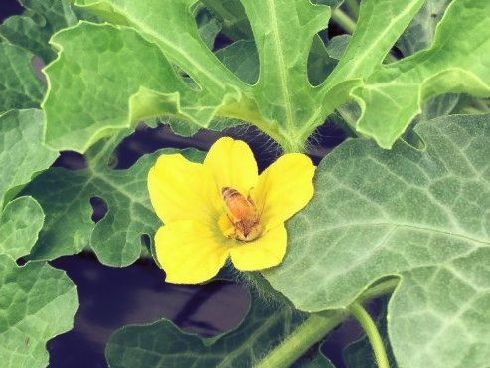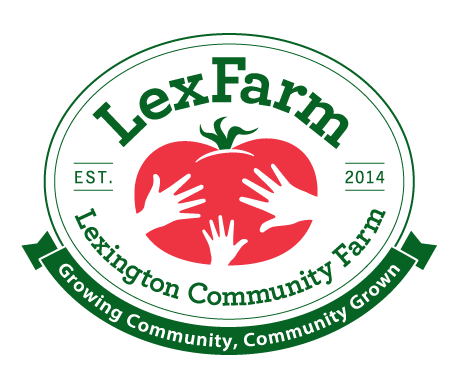End of Season Farm Report 2018

A Season in Review
2018 marked LexFarm’s most successful year yet! From early strawberries to our final Fall CSA distribution we harvested produce for a 30 week season—that’s 10 more weeks than last year!
Of note, we:
- Hired a dedicated farm stand manager and three bright farm crew who are interested in becoming career farmers
- Changed our tillage practices to better meet our soil’s needs
- Sold 50% more plants at our spring plant sales and 20% more goods at our farm stand than in 2017
- Improved our Summer CSA by increasing choice, variety and quantity of vegetables in the share
- Started a 50 member Fall CSA
Our efforts paid off! Our feedback in the farm stand was excellent, we exceeded every farm budgetary goal, and several staff members will return to take on added responsibility in 2019.
Growing Season:
Weather
The 2018 farm season dealt us a varied, challenging weather pattern. On the upside, our staff got to learn about addressing plant stress in every kind of weather!
A cool late spring yielded a bountiful greens harvest for the beginning of the CSA. Our farm crew became familiar with using row covers for organic pest management, as the cool season pests stuck around for a long time. In June we began a dry, hot stretch which registered eastern Massachusetts on the US Drought Monitor. We began irrigating night and day to help fruiting plants set flowers on time, and to keep our lettuce sweet. Our zucchini and cucumber yields set new records in the heat, and we were able to donate the excess. All staff learned how to set up drip irrigation during this stretch. By the beginning of September, it was still unseasonably warm, so we kept seeding fall greens in case the warm fall continued. It did not. Our fall was wet and cold! Fall crops slowed their growth earlier than usual, and we lost lettuce to cold nights in late November.
With a little bit of every kind of weather, it was a great experience for our staff to learn about reacting to weather patterns with our infrastructure and tools at LexFarm.
Pests
Our biweekly visits from a UMass Pest and Disease Scout provided additional learning experience for all staff. Through this partnership we learned how to identify and manage the most damaging pests and plant diseases on the farm.
The wet fall weather compounded drainage issues in our heavy soils. We began a new bed preparation regimen of subsoiling and chiseling to break up hardpan and create drainage channels. This mitigated standing water in our fields, but could not prevent the onset of brassica disease that all area farmers experienced this fall.
Larger animal pests remain a challenge at LexFarm. In early spring, deer found our strawberries and began eating the plants as they bloomed. We put up an electric fence to scare off deer and were able to harvest a delicious crop of strawberries! Between June and August, we lost significant quantities of lettuce, pumpkin, and watermelon plants to rabbits, wood chucks, and Canadian geese. Next year we will use more fencing to discourage four-legged animals from entering the field—not much we can do to prevent attacks from the air!
Soil
This season we continued a targeted approach to fertility, primarily adding nitrogen and low amounts of boron and potassium based on last fall’s soil tests. Our organic matter remains high, a result of planting cover crops each fall, using straw mulch for weed suppression, and an abundance of weeds.
We began a new bed preparation routine this year involving a chisel plow, subsoiler, and disk harrow. We replaced all moldboard plowing (cutting through the soil and flipping each slice over on itself) with chisel plowing. The chisel plow slices through the soil without inverting the soil profile, leaving soil biology relatively intact. We used the subsoiler to slice an 18” channel through the soil, breaking up hardpan and creating a path for water to drain. We noticed improved drainage and low disease pressure until the frequent fall rains began. Changing our soil’s traits is a slow process and we expect continued improvement next year.
Staff
In his fourth year at LexFarm, Tim became our Executive Director, piloting a new Education and Events program (see our Annual report) and bringing essential leadership to our growing organization. He helped out on the shoulder ends of the farm season; made sure all behind-the-scenes administration happened accurately and on time; and was always quick to lend a hand, encouragement, and advice.
In her third year at LexFarm, Elena became the Farm Manager and built on her 2017 crop planning and soil health practices to set systems in place for healthy growth at the farm. She added a new Fall CSA to our 2018 offerings and discovered a love for teaching new farmers.
In her third year farming, Emmy joined us in April as the Assistant Grower. She was instrumental in growing seedlings for our spring plant sale, led our Second Saturday volunteer days, quickly became a reliable tractor operator, and organized our successful Fall Bulk Sale.
Our growing customer base highlighted the need for a Farm Stand Manager this year. Momoko rose to the occasion and made this our most successful season in the farm stand yet. As demand and sales increased Momoko kept pace, adding local fruit to our offerings and communicating with our local vendors to keep the farm stand looking bountiful. She helped us in the fields every week, and brightened the farm stand with her late season flower bouquets.
Allison and Alexandra joined us in late May as Farm Apprentices to help plant, weed, harvest, irrigate, and cultivate. In her third year farming, Allison quickly mastered the cultivating tractor, and implemented new systems to improve our post-harvest handling. In her first year farming, Alexandra got a taste for the hard work behind the vegetables she loves, and was instrumental in problem-solving several farm projects.
This year we had many returning work-for-shares and a few new faces on the farm. Betsy officially joined us as CSA Administrator and patiently tracked all CSA sign ups and payments. First year work-for-shares Ashley, Cliff and Toni helped with morning harvests for the stand and CSA. Greg stayed on until December in his third season at the farm, adding experience and an ever-growing recipe collection to our morning harvests. In the farm stand, Ellen and Esther returned for their third seasons, and Susan returned for her second season, to answer customers’ questions, keep CSA bins stocked, and provide cooking suggestions for the familiar and new!
We’re expecting much of our staff and work-for-share members to return next year, and we wish them a restful winter season.
CSA
The CSA remains the largest piece of our customer support and our biggest source of income. Just as we rely on good farmers to grow food, we need good eaters to enjoy it! We began a 50 member Fall CSA, increased our PYO Flower season by 2 weeks, and sold out our 200 member Summer CSA in April! We have put a lot of thought into improving our CSA and it’s catching on!
Summer CSA members received 15% more produce than the cost of their share. We continued our partnership with Picadilly Farm, who provided about 1/7 of the share this year. Shareholders received 23 lbs of tomatoes, 2 weeks of strawberries, 8 weeks of cherry tomatoes, 8 weeks of lettuce, 4 weeks of winter squash, 5 weeks of cucumbers, an allium every week, 5 weeks of beans and peas, 13 weeks of cooking greens, and more! We limited zucchini and summer squash to 15 lbs this year, deciding to donate excess amounts so that we could give shareholders more variety. Our crew harvested more CSA produce than in previous years, saving Pick-Your-Own for the fun crops like garlic scapes, cherry tomatoes and green beans. Now that Elena has added a few favorite unusual varieties to the CSA, it’s fun to hear customers ask for vegetables by their specific name, such as “Magda” summer squash.
Flower CSA members picked for 12 weeks this year. This extended season allowed us to add early varieties like calendula, ammi, cynoglossum, and bachelor’s button to the field. Momoko, who brings five years of flower growing experience to the farm, will advise on flower varieties for the 2019 CSA and we can’t wait to see what she’ll add!
Fall CSA members received a mix of sweet root crops, hearty winter squash, and greens harvested fresh from the field! On December 14, we harvested the last of our kale from the field for the final distribution. We learned quickly that there is a high demand for produce in November and December and Elena is adding more late plantings to the crop plan for 2019 accordingly.
Infrastructure
Our 2018 season marked a turning point in LexFarm’s growth. Rather than adding new structures or equipment that are essential to simply have a farm, we’ve begun building on existing systems to improve our efficiency and organization as we grow.
Wash Station: Last winter Mark G whitewashed our wash station, making the whole room brighter and easier to work in. The farm crew reorganized the wash station to improve efficiency and comfort for employees.
Super A: Mark M spent several hours repairing the Super A cultivating tractor mid-summer. It now runs reliably and, with new cultivating implements, will be instrumental in controlling weeds next season.
Pumphouse: Mark M and Mark G repaired and insulated the pumphouse so we have a storage place on the farm that will stay above freezing year-round.
Equipment: We put our silage tarps into use last winter and as a result were able to use some of our traditionally wet fields early in April to seed carrots, herbs, and peas. We continued borrowing a chisel plow from neighboring Soluna Farm and used it for primary tillage in our fields. We look forward to purchasing our own this winter. We used our subsoiler to improve drainage in our soils, just in time for an incredibly wet fall. We purchased a disk harrow to help chop up cover crops and turn over fields quickly to increase yields.
In late spring an aging, unreliable greenhouse furnace kept Elena up several nights. This winter we will invest in a new heater unit and backup heater so farmers can sleep well, knowing the greenhouse is warm.
Elena Colman
Farm Manager
Thank You
We love our CSA for many reasons. As you know, the CSA model provides funds early in the season to pay staff, buy seeds, and order supplies before we begin harvesting vegetables. Another benefit is that our weekly pickups mean we’re guaranteed to see our shareholders once a week. Our CSA brings people to the farm.
This is Lexington Community Farm’s fifth season. It has been a pleasure to not only steward this piece of farmland, but to continue to provide a place for the community of thoughtful, friendly, enthusiastic, diverse eaters and customers that have come year after year and week after week to shop at the farm stand and pick up their CSA shares. Many of our shareholders and customers have been visiting the farm since it’s first season as Lexington Community Farm in 2014—and many go even further back with Busa Farm.
This winter, as we’re walking across the frozen farm and planning for next year, we feel optimistic. We know that come spring, our customers will continue to play their vital role in the success of the farm and we are already looking forward to their return.
In addition to our work growing for the CSA and running the farm stand, we’ve donated more produce than last year– $26,000 of fresh vegetables to food rescue organizations Lovin’ Spoonfuls, FoodLink, and the Boston Area Gleaners. Additionally, we’ve processed just under $3,000 of food stamp transactions at the farm stand.
This year we were excited to build a new Learning Garden and hold new programs and events at the farm. Education program attendees, combined with our CSA and farm stand customers, had the farm even busier than last year. Our education classes served over 400 participants in classes ranging from mushroom growing to flower arranging. We had over 700 attendees at this year’s events.
We are excited and poised for another great year of farming and programming next year. Stick around to see what’s in store!
See you next year!
As we bid farewell to Farm Manager Elena Colman, we wish her luck next year running her own farm, Small Farm in Stow, MA. Her work, like her footsteps, has blanketed the farm’s buildings and fields over the past three years. Improvements, shapes of fields, nails hammered, and screws sunk will all bear her mark long after she is gone. We will miss her steadfast work ethic, but we know that her legacy at LexFarm, like farmers past, will remain in the soil, in our farm buildings, and in our farm systems for a long time to come. Thank you, Elena!
Tim Hines
Executive Director
